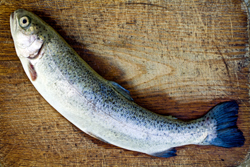Disease immunity in rainbow trout
Demand for fish continues to grow as they are a cheap source of protein for many people across the globe. However, the world's fisheries are becoming severely depleted and increasingly aquaculture is required to fill the gap. One of the greatest challenges in fish farming is to control and prevent infectious diseases that can cause serious economic losses. This can be achieved by improving our understanding of the fish immune system. Rainbow trout are one of the most valuable fish species farmed in Europe. The EU-funded Smartfish project has investigated the rainbow trout's immune system, focusing on interleukin 2 (IL-2). This signalling molecule is instrumental in the organism's response to microbial infection. Researchers studied the potential signalling pathways involved and the use of IL-2 as an adjuvant, which can enhance the action of fish vaccines. After characterising IL-2, Smartfish researchers concentrated on IL-21, which influences T helper 17 cells (Th17) that play an important role in antimicrobial immunity. Project partners successfully determined the structure of IL-21 and analysed its function in rainbow trout. The work conducted by the Smartfish consortium will help improve the quantity and quality of rainbow trout raised in fish farms, enabling European aquaculture to compete with the rest of the world.







